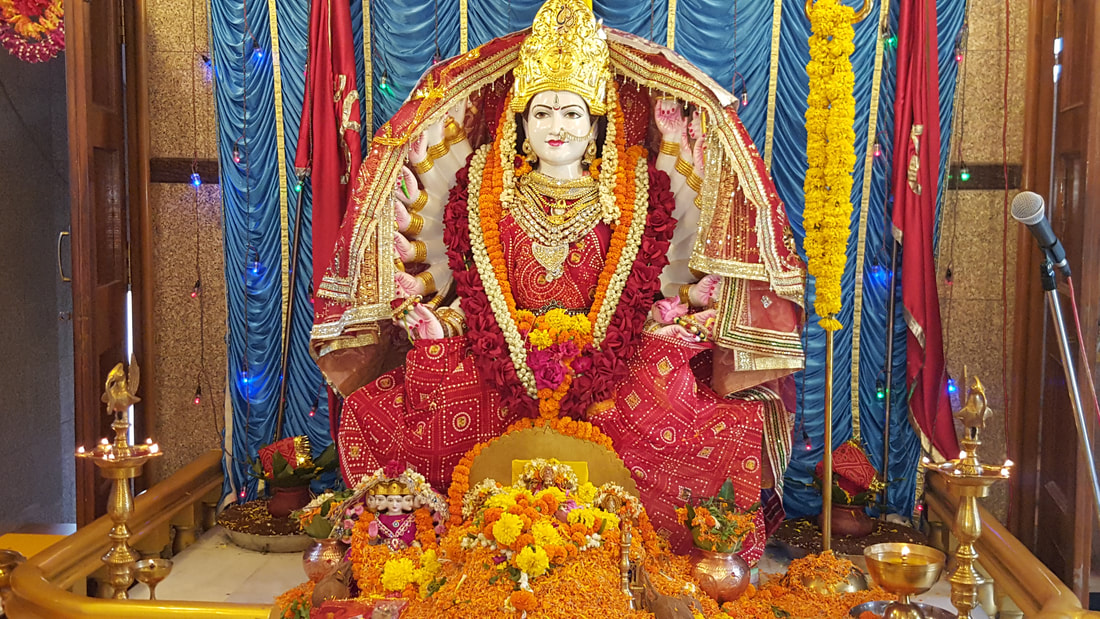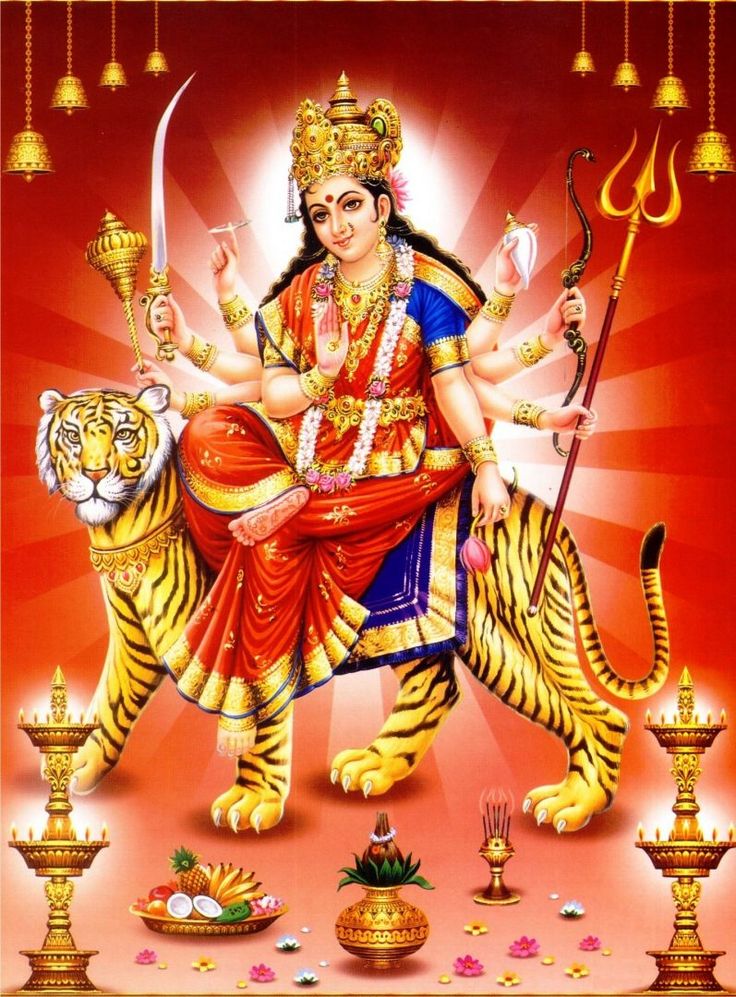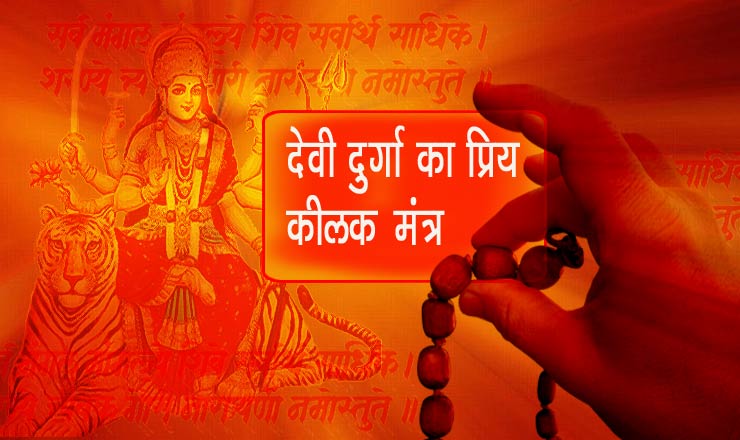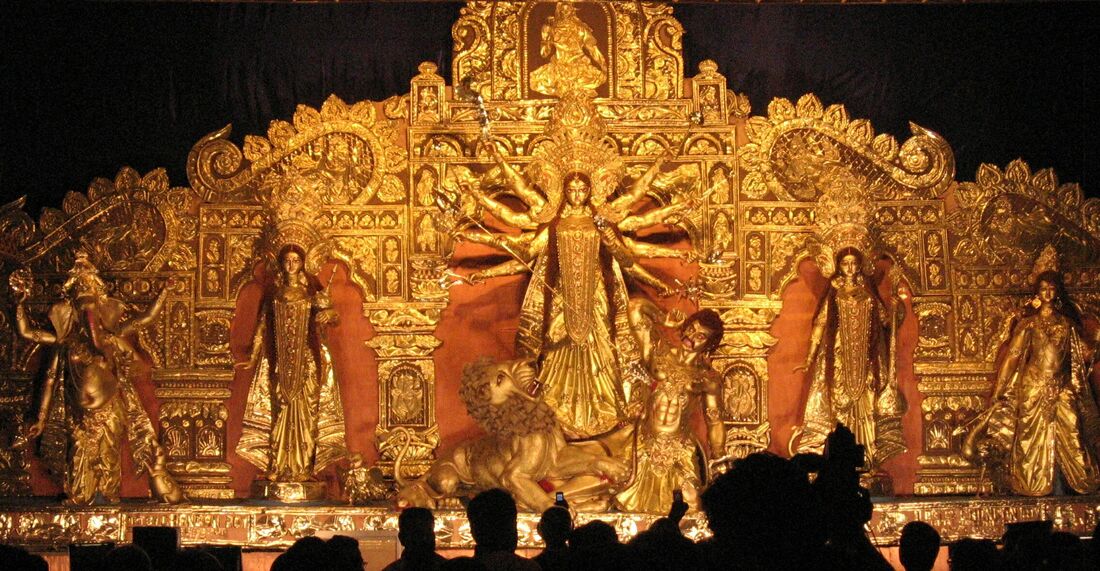|
The rishi spoke:
In ancient period, Indra’s (sovereignty) over the three worlds and his portions of the sacrifices were taken away by the asuras, Shumbha and Nishumbha, by force. Due to pride of their power and strength, the two took over the offices of the sun, the moon, Kubera, Yama, and Varuna. They robbed the kingdom of three worlds from three world and of his portions of the sacrifices; they both assumed the sun’s dignity and the moon’s dominion, and Kubera’s and Yama’s and Varuṇa’s; and they both exercised Vayu’s authority and Agni’s sphere of action. Thereby the gods were scattered, deprived of their sovereignties, and put to rout. The thirty gods, bereft of their dominion and set at naught by those two great Asuras, all recall to mind that never-vanquished goddess, — “She granted us the boon, ‘As & when in calamities shall remember, that very moment will I put an end to all your direst calamities.” Making this resolve the gods went to Himalaya, and there raised their hymn to the goddess, who is Vishnu’s illusive power. The Devas spoke:
The rishi spoke: While the gods were thus engaged in offering hymns and other reverential acts, Parvati came there to bathe in the water of the Ganges. She, the beautiful-browed, said to those gods, — “Whom do you hymn here?” And springing forth from the treasure-house of her body the auspicious goddess spoke — “For me this hymn is uttered by the assembled gods, who have been set at naught by the Daitya Shumbha and routed in battle by Nishumbha.” Because Ambika issued forth from the treasure-house of Parvati’s body, she is therefore named in song as Kauṣiki among all the worlds. Now after she had issued forth, the other also, even Parvati, became black; she is celebrated as Kalika; she fixed her abode on Mount Himalaya. Thereafter, Chaṇḍa, and Muṇḍa, the two attendants of Shumbha and Nishumbba, saw Ambika displaying her sublime and most captivating form. They both told Shumbha: ‘O King, one woman, most surpassingly beautiful, dwells there shedding luster on mount Himalaya and illuminating the regions. Such supreme beauty was never seen by anyone anywhere. Ascertain who that Goddess is and take possession of her, O Lord of the asuras! Nishumbha has every kind of gem produced in the sea. Fire also gave you two garments, which are purified by fire. O lord, all those display their splendor at this present time in your house. Airavata, gem among elephants, has been captured from Purandara; and this Parijata tree and the horse Uccaiḥshravas. Here stands the heavenly chariot yoked with swans in your courtyard; it has been brought here, the wonderful chariot composed of gems, which belonged to Brahma. Here is the Nidhi Mahapadma, captured from the Lord of wealth. And the Ocean gave a garland made of filaments and of undying lotus flowers. In thy house stands Varuṇa’s umbrella, which streams with gold. And here is the choice chariot that belonged to Prajapati formerly. You have carried off Death’s power which is named Utkranti-da. The noose of the Ocean-king is in thy brother's possession. And Nishumbha has every kind of gem which is produced in the sea. Agni also gave thee two garments which are purified by fire. Thus, O lord of the Daityas, all gems have been captured by you; why not you seize this auspicious lady, this gem of womankind?” Thus, O Lord of asuras, all gems, precious stones, elephants, horses and other valuable things indeed exist in the three worlds, have been brought by you. Why is this beautiful lady-jewel not seized by you? The rishi spoke: On hearing these words of Chanda and Munda, Shumbha sent the great asura Sugriva as messenger to the Devi. He said: Go and tell her thus in my words and do the thing in such a manner that she may quickly come to me in love. He went there where the Devi was staying in a very beautiful spot on the mountain and spoke to her in fine and sweet words. The messenger said: O Devi, Shumbha, lord of asuras, is the supreme sovereign of three worlds. Sent by him as messenger, I have come here to your presence. Hearken to what has been said by him whose command is never resisted among the devas and who has vanquished all the foes of the asuras: (He says), “All the three worlds are mine and the devas are obedient to me. We look upon you, O Devi, as the jewel of womankind in the world. You who are such, come to me, since we are the enjoyers of the best objects. Take to me or to my younger brother Nishumbha of great prowess, O unsteady-eyed lady, for you are in truth a jewel. Wealth, great and beyond compare, you will get by marrying me. Think over this in your mind and become my wife.” The Rishi said: Thus told, Durga the adorable and auspicious, by whom this universe is supported, then became serene. The Devi said: You have spoken truth; nothing false has been uttered by you in this matter. Shumbha is indeed the sovereign of the three worlds and likewise is also Nishumbha. But in this matter, how can that which has been promised to be made false? Hear what promise I had made already out of foolishness. “He who conquers me in battle, removes my pride and is my match in strength in the world shall be my husband.” So let Shumbha come here then, or Nishumbha the great asura. Vanquishing me here let him soon take my hand in marriage. Why delay? The messenger said: O Devi, you are haughty. Talk not so before me. Which man in the three worlds will stand before Shumbha and Nishumbha? All the devas verily cannot stand face to face with even the other asuras in battle. Why mention you, O Devi, a single woman? Indra and all other devas could not stand in battle against Shumbha and other demons, how will you, a woman, face them? On my word itself, you go to Shumbha and Nishumbha. Let it not be that you go to them with your dignity lost by being dragged by your hair. The Devi said: Yes, true, Shumbha is strong and so is Nishumbha exceedingly heroic! What can I do since there stands my ill-considered vow taken long ago? Go back and tell the lord of asuras carefully all this that I have said; let him do whatever he considers proper. Here ends the fifth chapter called ‘Devi’s conversation with the messenger’ of the Devi-Mahatmya in Markandeya-Purana during the period of Savarni, the Manu. ॥ पञ्चमोऽध्यायः ॥ विनियोगः अस्य श्री उत्तरचरित्रस्य रुद्र ऋषिः । श्रीमहासरस्वती देवता ।अनुष्टुप् छन्दः । भीमा शक्तिः । भ्रामरी बीजम् । सूर्यस्तत्त्वम् । सामवेदः स्वरूपम् । श्रीमहासरस्वतीप्रीत्यर्थे उत्तरचरित्रपाठे विनियोगः । ध्यानम् घण्टाशूलहलानि शङ्खमुसले चक्रं धनुः सायकं हस्ताब्जैर्दधतीं घनान्तविलसच्छीतांशुतुल्यप्रभाम् । गौरीदेहसमुद्भवां त्रिजगतामाधारभूतां महापूर्वामत्र सरस्वतीमनुभजे शुम्भादिदैत्यार्दिनीम् ॥ ॐ क्लीं ऋषिरुवाच ॥ १॥ पुरा शुम्भनिशुम्भाभ्यामसुराभ्यां शचीपतेः । त्रैलोक्यं यज्ञभागाश्च हृता मदबलाश्रयात् ॥ २॥ तावेव सूर्यतां तद्वदधिकारं तथैन्दवम् । कौबेरमथ याम्यं च चक्राते वरुणस्य च ॥ ३॥ तावेव पवनर्द्धिं च चक्रतुर्वह्निकर्म च । ततो देवा विनिर्धूता भ्रष्टराज्याः पराजिताः ॥ ४॥ हृताधिकारास्त्रिदशास्ताभ्यां सर्वे निराकृताः । महासुराभ्यां तां देवीं संस्मरन्त्यपराजिताम् ॥ ५॥ तयास्माकं वरो दत्तो यथापत्सु स्मृताखिलाः । भवतां नाशयिष्यामि तत्क्षणात्परमापदः ॥ ६॥ इति कृत्वा मतिं देवा हिमवन्तं नगेश्वरम् । जग्मुस्तत्र ततो देवीं विष्णुमायां प्रतुष्टुवुः ॥ ७॥ देवा ऊचुः ॥ ८॥ नमो देव्यै महादेव्यै शिवायै सततं नमः । नमः प्रकृत्यै भद्रायै नियताः प्रणताः स्म ताम् ॥ ९॥ रौद्रायै नमो नित्यायै गौर्यै धात्र्यै नमो नमः । ज्योत्स्नायै चेन्दुरूपिण्यै सुखायै सततं नमः ॥ १०॥ कल्याण्यै प्रणतां वृद्ध्यै सिद्ध्यै कुर्मो नमो नमः । नैरृत्यै भूभृतां लक्ष्म्यै शर्वाण्यै ते नमो नमः ॥ ११॥ दुर्गायै दुर्गपारायै सारायै सर्वकारिण्यै । ख्यात्यै तथैव कृष्णायै धूम्रायै सततं नमः ॥ १२॥ अतिसौम्यातिरौद्रायै नतास्तस्यै नमो नमः । नमो जगत्प्रतिष्ठायै देव्यै कृत्यै नमो नमः ॥ १३॥ या देवी सर्वभूतेषु विष्णुमायेति शब्दिता । नमस्तस्यै नमस्तस्यै नमस्तस्यै नमो नमः ॥ १४-१६॥ या देवी सर्वभूतेषु चेतनेत्यभिधीयते । नमस्तस्यै नमस्तस्यै नमस्तस्यै नमो नमः ॥ १७-१९॥ या देवी सर्वभूतेषु बुद्धिरूपेण संस्थिता । नमस्तस्यै नमस्तस्यै नमस्तस्यै नमो नमः ॥ २०-२२॥ या देवी सर्वभूतेषु निद्रारूपेण संस्थिता । नमस्तस्यै नमस्तस्यै नमस्तस्यै नमो नमः ॥ २३-२५॥ या देवी सर्वभूतेषु क्षुधारूपेण संस्थिता । नमस्तस्यै नमस्तस्यै नमस्तस्यै नमो नमः ॥ २६-२८॥ या देवी सर्वभूतेषु छायारूपेण संस्थिता । नमस्तस्यै नमस्तस्यै नमस्तस्यै नमो नमः ॥ २९-३१॥ या देवी सर्वभूतेषु शक्तिरूपेण संस्थिता । नमस्तस्यै नमस्तस्यै नमस्तस्यै नमो नमः ॥ ३२-३४॥ या देवी सर्वभूतेषु तृष्णारूपेण संस्थिता । नमस्तस्यै नमस्तस्यै नमस्तस्यै नमो नमः ॥ ३५-३७॥ या देवी सर्वभूतेषु क्षान्तिरूपेण संस्थिता । नमस्तस्यै नमस्तस्यै नमस्तस्यै नमो नमः ॥ ३८-४०॥ या देवी सर्वभूतेषु जातिरूपेण संस्थिता । नमस्तस्यै नमस्तस्यै नमस्तस्यै नमो नमः ॥ ४१-४३॥ या देवी सर्वभूतेषु लज्जारूपेण संस्थिता । नमस्तस्यै नमस्तस्यै नमस्तस्यै नमो नमः ॥ ४४-४६॥ या देवी सर्वभूतेषु शान्तिरूपेण संस्थिता । नमस्तस्यै नमस्तस्यै नमस्तस्यै नमो नमः ॥ ४७-४९॥ या देवी सर्वभूतेषु श्रद्धारूपेण संस्थिता ।नमस्तस्यै नमस्तस्यै नमस्तस्यै नमो नमः ॥ ५०-५२॥ या देवी सर्वभूतेषु कान्तिरूपेण संस्थिता । नमस्तस्यै नमस्तस्यै नमस्तस्यै नमो नमः ॥ ५३-५५॥ या देवी सर्वभूतेषु लक्ष्मीरूपेण संस्थिता । नमस्तस्यै नमस्तस्यै नमस्तस्यै नमो नमः ॥ ५६-५८॥ या देवी सर्वभूतेषु वृत्तिरूपेण संस्थिता । नमस्तस्यै नमस्तस्यै नमस्तस्यै नमो नमः ॥ ५९-६१॥ या देवी सर्वभूतेषु स्मृतिरूपेण संस्थिता । नमस्तस्यै नमस्तस्यै नमस्तस्यै नमो नमः ॥ ६२-६४॥ या देवी सर्वभूतेषु दयारूपेण संस्थिता । नमस्तस्यै नमस्तस्यै नमस्तस्यै नमो नमः ॥ ६५-६७॥ या देवी सर्वभूतेषु तुष्टिरूपेण संस्थिता । नमस्तस्यै नमस्तस्यै नमस्तस्यै नमो नमः ॥ ६८-७०॥ या देवी सर्वभूतेषु मातृरूपेण संस्थिता । नमस्तस्यै नमस्तस्यै नमस्तस्यै नमो नमः ॥ ७१-७३॥ या देवी सर्वभूतेषु भ्रान्तिरूपेण संस्थिता । नमस्तस्यै नमस्तस्यै नमस्तस्यै नमो नमः ॥ ७४-७६॥ इन्द्रियाणामधिष्ठात्री भूतानां चाखिलेषु या । भूतेषु सततं तस्यै व्याप्त्यै देव्यै नमो नमः ॥ ७७॥ चितिरूपेण या कृत्स्नमेतद् व्याप्य स्थिता जगत् । नमस्तस्यै नमस्तस्यै नमस्तस्यै नमो नमः ॥ ७८-८०॥ स्तुता सुरैः पूर्वमभीष्टसंश्रयात्तथा सुरेन्द्रेण दिनेषु सेविता । करोतु सा नः शुभहेतुरीश्वरी शुभानि भद्राण्यभिहन्तु चापदः ॥ ८१॥ या साम्प्रतं चोद्धतदैत्यतापितैरस्माभिरीशा च सुरैर्नमस्यते । या च स्मृता तत्क्षणमेव हन्ति नः सर्वापदो भक्तिविनम्रमूर्तिभिः ॥ ८२॥ ऋषिरुवाच ॥ ८३॥ एवं स्तवाभियुक्तानां देवानां तत्र पार्वती । स्नातुमभ्याययौ तोये जाह्नव्या नृपनन्दन ॥ ८४॥ साब्रवीत्तान् सुरान् सुभ्रूर्भवद्भिः स्तूयतेऽत्र का । शरीरकोशतश्चास्याः समुद्भूताब्रवीच्छिवा ॥ ८५॥ स्तोत्रं ममैतत्क्रियते शुम्भदैत्यनिराकृतैः । देवैः समेतैः समरे निशुम्भेन पराजितैः ॥ ८६॥ शरीरकोशाद्यत्तस्याः पार्वत्या निःसृताम्बिका । कौशिकीति समस्तेषु ततो लोकेषु गीयते ॥ ८७॥ तस्यां विनिर्गतायां तु कृष्णाभूत्सापि पार्वती । कालिकेति समाख्याता हिमाचलकृताश्रया ॥ ८८॥ ततोऽम्बिकां परं रूपं बिभ्राणां सुमनोहरम् । ददर्श चण्डो मुण्डश्च भृत्यौ शुम्भनिशुम्भयोः ॥ ८९॥ ताभ्यां शुम्भाय चाख्याता सातीव सुमनोहरा । काप्यास्ते स्त्री महाराज भासयन्ती हिमाचलम् ॥ ९०॥ नैव तादृक् क्वचिद्रूपं दृष्टं केनचिदुत्तमम् । ज्ञायतां काप्यसौ देवी गृह्यतां चासुरेश्वर ॥ ९१॥ स्त्रीरत्नमतिचार्वङ्गी द्योतयन्ती दिशस्त्विषा । सा तु तिष्ठति दैत्येन्द्र तां भवान् द्रष्टुमर्हति ॥ ९२॥ यानि रत्नानि मणयो गजाश्वादीनि वै प्रभो । त्रैलोक्ये तु समस्तानि साम्प्रतं भान्ति ते गृहे ॥ ९३॥ ऐरावतः समानीतो गजरत्नं पुरन्दरात् । पारिजाततरुश्चायं तथैवोच्चैःश्रवा हयः ॥ ९४॥ विमानं हंससंयुक्तमेतत्तिष्ठति तेऽङ्गणे । रत्नभूतमिहानीतं यदासीद्वेधसोऽद्भुतम् ॥ ९५॥ निधिरेष महापद्मः समानीतो धनेश्वरात् । किञ्जल्किनीं ददौ चाब्धिर्मालामम्लानपङ्कजाम् ॥ ९६॥ छत्रं ते वारुणं गेहे काञ्चनस्रावि तिष्ठति । तथायं स्यन्दनवरो यः पुरासीत्प्रजापतेः ॥ ९७॥ मृत्योरुत्क्रान्तिदा नाम शक्तिरीश त्वया हृता । पाशः सलिलराजस्य भ्रातुस्तव परिग्रहे ॥ ९८॥ निशुम्भस्याब्धिजाताश्च समस्ता रत्नजातयः । वह्निरपि ददौ तुभ्यमग्निशौचे च वाससी ॥ ९९॥ एवं दैत्येन्द्र रत्नानि समस्तान्याहृतानि ते । स्त्रीरत्नमेषा कल्याणी त्वया कस्मान्न गृह्यते ॥ १००॥ ऋषिरुवाच ॥ १०१॥ निशम्येति वचः शुम्भः स तदा चण्डमुण्डयोः । प्रेषयामास सुग्रीवं दूतं देव्या महासुरम् ॥ १०२॥ इति चेति च वक्तव्या सा गत्वा वचनान्मम । यथा चाभ्येति सम्प्रीत्या तथा कार्यं त्वया लघु ॥ १०३॥ स तत्र गत्वा यत्रास्ते शैलोद्देशेऽतिशोभने । तां च देवीं ततः प्राह श्लक्ष्णं मधुरया गिरा ॥ १०४॥ दूत उवाच ॥ १०५॥ देवि दैत्येश्वरः शुम्भस्त्रैलोक्ये परमेश्वरः । दूतोऽहं प्रेषितस्तेन त्वत्सकाशमिहागतः ॥ १०६॥ अव्याहताज्ञः सर्वासु यः सदा देवयोनिषु । निर्जिताखिलदैत्यारिः स यदाह शृणुष्व तत् ॥ १०७॥ मम त्रैलोक्यमखिलं मम देवा वशानुगाः । यज्ञभागानहं सर्वानुपाश्नामि पृथक् पृथक् ॥ १०८॥ त्रैलोक्ये वररत्नानि मम वश्यान्यशेषतः । तथैव गजरत्नं च हृतं देवेन्द्रवाहनम् ॥ १०९॥ क्षीरोदमथनोद्भूतमश्वरत्नं ममामरैः । उच्चैःश्रवससंज्ञं तत्प्रणिपत्य समर्पितम् ॥ ११०॥ यानि चान्यानि देवेषु गन्धर्वेषूरगेषु च । रत्नभूतानि भूतानि तानि मय्येव शोभने ॥ १११॥ स्त्रीरत्नभूतां त्वां देवि लोके मन्यामहे वयम् । सा त्वमस्मानुपागच्छ यतो रत्नभुजो वयम् ॥ ११२॥ मां वा ममानुजं वापि निशुम्भमुरुविक्रमम् । भज त्वं चञ्चलापाङ्गि रत्नभूतासि वै यतः ॥ ११३॥ परमैश्वर्यमतुलं प्राप्स्यसे मत्परिग्रहात् । एतद्बुद्ध्या समालोच्य मत्परिग्रहतां व्रज ॥ ११४॥ ऋषिरुवाच ॥ ११५॥ इत्युक्ता सा तदा देवी गम्भीरान्तःस्मिता जगौ । दुर्गा भगवती भद्रा ययेदं धार्यते जगत् ॥ ११६॥ देव्युवाच ॥ ११७॥ सत्यमुक्तं त्वया नात्र मिथ्या किञ्चित्त्वयोदितम् । त्रैलोक्याधिपतिः शुम्भो निशुम्भश्चापि तादृशः ॥ ११८॥ किं त्वत्र यत्प्रतिज्ञातं मिथ्या तत्क्रियते कथम् । श्रूयतामल्पबुद्धित्वात्प्रतिज्ञा या कृता पुरा ॥ ११९॥ यो मां जयति सङ्ग्रामे यो मे दर्पं व्यपोहति । यो मे प्रतिबलो लोके स मे भर्ता भविष्यति ॥ १२०॥ तदागच्छतु शुम्भोऽत्र निशुम्भो वा महाबलः । मां जित्वा किं चिरेणात्र पाणिं गृह्णातु मे लघु ॥ १२१॥ दूत उवाच ॥ १२२॥ अवलिप्तासि मैवं त्वं देवि ब्रूहि ममाग्रतः । त्रैलोक्ये कः पुमांस्तिष्ठेदग्रे शुम्भनिशुम्भयोः ॥ १२३॥ अन्येषामपि दैत्यानां सर्वे देवा न वै युधि । तिष्ठन्ति सम्मुखे देवि किं पुनः स्त्री त्वमेकिका ॥ १२४॥ इन्द्राद्याः सकला देवास्तस्थुर्येषां न संयुगे । शुम्भादीनां कथं तेषां स्त्री प्रयास्यसि सम्मुखम् ॥ १२५॥ सा त्वं गच्छ मयैवोक्ता पार्श्वं शुम्भनिशुम्भयोः । केशाकर्षणनिर्धूतगौरवा मा गमिष्यसि ॥ १२६॥ देव्युवाच ॥ १२७॥ एवमेतद् बली शुम्भो निशुम्भश्चापितादृशः । किं करोमि प्रतिज्ञा मे यदनालोचिता पुरा ॥ १२८॥ स त्वं गच्छ मयोक्तं ते यदेतत्सर्वमादृतः । तदाचक्ष्वासुरेन्द्राय स च युक्तं करोतु यत् ॥ १२९॥ ॥ स्वस्ति श्रीमार्कण्डेयपुराणे सावर्णिके मन्वन्तरे देवीमाहात्म्ये देव्या दूतसंवादो नाम पञ्चमोऽध्यायः ॥ ५॥
0 Comments
Worship of Ambika by Indra & other devas – Sri Durga Saptashati (Chapter 4)
When that most valiant evil souled Mahishasura and his army were destroyed by the Devi, Indra and the hosts of other gods poured forth their praises to her with their voices, reverently bending down their necks and shoulders, while they looked extremely delighted with horripilation and exultation. (1-2) Devas said:
Here ends the fourth chapter called ‘The Devi Stuti’ of the Devi-Mahatmya in Markandeya-Purana during the period of Savarni, the Man ॥ चतुर्थोऽध्यायः ॥ ॐ ऋषिरुवाच ॥ १॥ शक्रादयः सुरगणा निहतेऽतिवीर्ये तस्मिन्दुरात्मनि सुरारिबले च देव्या । तां तुष्टुवुः प्रणतिनम्रशिरोधरांसा वाग्भिः प्रहर्षपुलकोद्गमचारुदेहाः ॥ २॥ देव्या यया ततमिदं जगदात्मशक्त्या निःशेषदेवगणशक्तिसमूहमूर्त्या । तामम्बिकामखिलदेवमहर्षिपूज्यां भक्त्या नताः स्म विदधातु शुभानि सा नः ॥ ३॥ यस्याः प्रभावमतुलं भगवाननन्तो ब्रह्मा हरश्च न हि वक्तुमलं बलं च । सा चण्डिकाखिलजगत्परिपालनाय नाशाय चाशुभभयस्य मतिं करोतु ॥ ४॥ या श्रीः स्वयं सुकृतिनां भवनेष्वलक्ष्मीः पापात्मनां कृतधियां हृदयेषु बुद्धिः । श्रद्धा सतां कुलजनप्रभवस्य लज्जा तां त्वां नताः स्म परिपालय देवि विश्वम् ॥ ५॥ किं वर्णयाम तव रूपमचिन्त्यमेतत् किञ्चातिवीर्यमसुरक्षयकारि भूरि । किं चाहवेषु चरितानि तवाति यानि सर्वेषु देव्यसुरदेवगणादिकेषु ॥ ६॥ हेतुः समस्तजगतां त्रिगुणापि दोषैर्न ज्ञायसे हरिहरादिभिरप्यपारा | सर्वाश्रयाखिलमिदं जगदंशभूतमव्याकृता हि परमा प्रकृतिस्त्वमाद्या ॥ ७॥ यस्याः समस्तसुरता समुदीरणेन तृप्तिं प्रयाति सकलेषु मखेषु देवि । स्वाहासि वै पितृगणस्य च तृप्तिहेतुरुच्चार्यसे त्वमत एव जनैः स्वधा च ॥ ८॥ या मुक्तिहेतुरविचिन्त्यमहाव्रता त्वं अभ्यस्यसे सुनियतेन्द्रियतत्त्वसारैः । मोक्षार्थिभिर्मुनिभिरस्तसमस्तदोषै र्विद्यासि सा भगवती परमा हि देवि ॥ ९॥ शब्दात्मिका सुविमलर्ग्यजुषां निधानमुद्गीथरम्यपदपाठवतां च साम्नाम् । देवि त्रयी भगवती भवभावनाय वार्तासि सर्वजगतां परमार्तिहन्त्री ॥ १०॥ मेधासि देवि विदिताखिलशास्त्रसारा दुर्गासि दुर्गभवसागरनौरसङ्गा । श्रीः कैटभारिहृदयैककृताधिवासा गौरी त्वमेव शशिमौलिकृतप्रतिष्ठा ॥ ११॥ ईषत्सहासममलं परिपूर्णचन्द्रबिम्बानुकारि कनकोत्तमकान्तिकान्तम् । अत्यद्भुतं प्रहृतमात्तरुषा तथापि वक्त्रं विलोक्य सहसा महिषासुरेण ॥ १२॥ दृष्ट्वा तु देवि कुपितं भ्रुकुटीकराल मुद्यच्छशाङ्कसदृशच्छवि यन्न सद्यः । प्राणान् मुमोच महिषस्तदतीव चित्रं कैर्जीव्यते हि कुपितान्तकदर्शनेन ॥ १३॥ देवि प्रसीद परमा भवती भवाय सद्यो विनाशयसि कोपवती कुलानि । विज्ञातमेतदधुनैव यदस्तमेतन्नीतं बलं सुविपुलं महिषासुरस्य ॥ १४॥ ते सम्मता जनपदेषु धनानि तेषां तेषां यशांसि न च सीदति बन्धुवर्गः । धन्यास्त एव निभृतात्मजभृत्यदारा येषां सदाभ्युदयदा भवती प्रसन्ना ॥ १५॥ धर्म्याणि देवि सकलानि सदैव कर्माण्यत्यादृतः प्रतिदिनं सुकृती करोति । स्वर्गं प्रयाति च ततो भवती प्रसादाल्लोकत्रयेऽपि फलदा ननु देवि तेन ॥ १६॥ दुर्गे स्मृता हरसि भीतिमशेषजन्तोः स्वस्थैः स्मृता मतिमतीव शुभां ददासि । दारिद्र्यदुःखभयहारिणि का त्वदन्या सर्वोपकारकरणाय सदार्द्रचित्ता ॥ १७॥ एभिर्हतैर्जगदुपैति सुखं तथैते कुर्वन्तु नाम नरकाय चिराय पापम् । सङ्ग्राममृत्युमधिगम्य दिवं प्रयान्तु मत्वेति नूनमहितान्विनिहंसि देवि ॥ १८॥ दृष्ट्वैव किं न भवती प्रकरोति भस्म सर्वासुरानरिषु यत्प्रहिणोषि शस्त्रम् । लोकान्प्रयान्तु रिपवोऽपि हि शस्त्रपूता इत्थं मतिर्भवति तेष्वहितेषुसाध्वी ॥ १९॥ खड्गप्रभानिकरविस्फुरणैस्तथोग्रैः शूलाग्रकान्तिनिवहेन दृशोऽसुराणाम् । यन्नागता विलयमंशुमदिन्दुखण्डयोग्याननं तव विलोकयतां तदेतत् ॥ २०॥ दुर्वृत्तवृत्तशमनं तव देवि शीलं रूपं तथैतदविचिन्त्यमतुल्यमन्यैः । वीर्यं च हन्तृ हृतदेवपराक्रमाणां वैरिष्वपि प्रकटितैव दया त्वयेत्थम् ॥ २१॥ केनोपमा भवतु तेऽस्य पराक्रमस्य रूपं च शत्रुभयकार्यतिहारि कुत्र । चित्ते कृपा समरनिष्ठुरता च दृष्टा त्वय्येव देवि वरदे भुवनत्रयेऽपि ॥ २२॥ त्रैलोक्यमेतदखिलं रिपुनाशनेनत्रातं त्वया समरमूर्धनि तेऽपि हत्वा । नीता दिवं रिपुगणा भयमप्यपास्तम् अस्माकमुन्मदसुरारिभवं नमस्ते ॥ २३॥ शूलेन पाहि नो देवि पाहि खड्गेन चाम्बिके । घण्टास्वनेन नः पाहि चापज्यानिःस्वनेन च ॥ २४॥ प्राच्यां रक्ष प्रतीच्यां च चण्डिके रक्ष दक्षिणे । भ्रामणेनात्मशूलस्य उत्तरस्यां तथेश्वरि ॥ २५॥ सौम्यानि यानि रूपाणि त्रैलोक्ये विचरन्ति ते । यानि चात्यन्तघोराणि तै रक्षास्मांस्तथा भुवम् ॥ २६॥ खड्गशूलगदादीनि यानि चास्त्रानि तेऽम्बिके । करपल्लवसङ्गीनि तैरस्मान्रक्ष सर्वतः ॥ २७॥ ऋषिरुवाच ॥ २८॥ एवं स्तुता सुरैर्दिव्यैः कुसुमैर्नन्दनोद्भवैः । अर्चिता जगतां धात्री तथा गन्धानुलेपनैः ॥ २९॥ भक्त्या समस्तैस्त्रिदशैर्दिव्यैर्धूपैः सुधूपिता । प्राह प्रसादसुमुखी समस्तान् प्रणतान् सुरान् ॥ ३०॥ देव्युवाच ॥ ३१॥ व्रियतां त्रिदशाः सर्वे यदस्मत्तोऽभिवाञ्छितम् ॥ ३२॥ देवा ऊचुः ॥ ३३॥ भगवत्या कृतं सर्वं न किञ्चिदवशिष्यते ॥ ३४॥ यदयं निहतः शत्रुरस्माकं महिषासुरः । यदि चापि वरो देयस्त्वयास्माकं महेश्वरि ॥ ३५॥ संस्मृता संस्मृता त्वं नो हिंसेथाः परमापदः । यश्च मर्त्यः स्तवैरेभिस्त्वां स्तोष्यत्यमलानने ॥ ३६॥ तस्य वित्तर्द्धिविभवैर्धनदारादिसम्पदाम् । वृद्धयेऽस्मत्प्रसन्ना त्वं भवेथाः सर्वदाम्बिके ॥ ३७॥ ऋषिरुवाच ॥ ३८॥ इति प्रसादिता देवैर्जगतोऽर्थे तथात्मनः । तथेत्युक्त्वा भद्रकाली बभूवान्तर्हिता नृप ॥ ३९॥ इत्येतत्कथितं भूप सम्भूता सा यथा पुरा । देवी देवशरीरेभ्यो जगत्त्रयहितैषिणी ॥ ४०॥ पुनश्च गौरीदेहात्सा समुद्भूता यथाभवत् । वधाय दुष्टदैत्यानां तथा शुम्भनिशुम्भयोः ॥ ४१॥ रक्षणाय च लोकानां देवानामुपकारिणी । तच्छृणुष्व मयाख्यातं यथावत्कथयामि ते ॥ ४२॥ । ह्रीं ॐ । ॥ स्वस्ति श्रीमार्कण्डेयपुराणे सावर्णिके मन्वन्तरे देवीमाहात्म्ये शक्रादिस्तुतिर्नाम चतुर्थोऽध्यायः ॥ ४॥ Keelaka Stotram
Rishi Markandeya tells his disciples in sixteen shlokas the ways and means of removing obstacles faced by devotees while reading Sri Durga Saptashati (Devi Mahatmyam). Reading of Keelakam brings blessings of Devi, spiritual harmony, peace of mind and success in all pursuits. Before commencing the Durga Saptashati chanting and after Devi Kavacham & Agrala Strotam, Goddess’s devotees generally chant Keelakam. Kshama Prayer is done after recitation od Durga Saptashati, each time to seek forgiveness for committing deficiencies or excesses. Verse-wise, the essence of Keelakam has been given hereunder. The verses in Sanskrit are mentioned at the end of explanations.
Kshama Prayer
॥ अथ कीलकस्तोत्रम् ॥ ॐ अस्य श्रीकीलकमन्त्रस्य शिवऋषिः, अनुष्टुप् छन्दः, श्रीमहासरस्वती देवता, श्रीजगदम्बाप्रीत्यर्थं सप्तशतीपाठाङ्गत्वेन जपे विनियोगः । ॐ नमश्चण्डिकायै । मार्कण्डेय उवाच । ॐ विशुद्धज्ञानदेहाय त्रिवेदीदिव्यचक्षुषे । श्रेयःप्राप्तिनिमित्ताय नमः सोमार्धधारिणे ॥ १॥ सर्वमेतद्विजानीयान्मन्त्राणामपि कीलकम् । सोऽपि क्षेममवाप्नोति सततं जप्यतत्परः ॥ २॥ सिद्ध्यन्त्युच्चाटनादीनि कर्माणि सकलान्यपि । एतेन स्तुवतां देवीं स्तोत्रवृन्देन भक्तितः ॥ ३॥ न मन्त्रो नौषधं तस्य न किञ्चिदपि विद्यते । विना जप्येन सिद्ध्येत्तु सर्वमुच्चाटनादिकम् ॥ ४॥ समग्राण्यपि सेत्स्यन्ति लोकशङ्कामिमां हरः । कृत्वा निमन्त्रयामास सर्वमेवमिदं शुभम् ॥ ५॥ स्तोत्रं वै चण्डिकायास्तु तच्च गुह्यं चकार सः । समाप्नोति स पुण्येन तां यथावन्निमन्त्रणाम् ॥ ६॥ सोऽपि क्षेममवाप्नोति सर्वमेव न संशयः । कृष्णायां वा चतुर्दश्यामष्टम्यां वा समाहितः ॥ ७॥ ददाति प्रतिगृह्णाति नान्यथैषा प्रसीदति । इत्थं रूपेण कीलेन महादेवेन कीलितम् ॥ ८॥ यो निष्कीलां विधायैनां चण्डीं जपति नित्यशः । स सिद्धः स गणः सोऽथ गन्धर्वो जायते ध्रुवम् ॥ ९॥ न चैवापाटवं तस्य भयं क्वापि न जायते । नापमृत्युवशं याति मृते च मोक्षमाप्नुयात् ॥ १०॥ ज्ञात्वा प्रारभ्य कुर्वीत ह्यकुर्वाणो विनश्यति । ततो ज्ञात्वैव सम्पूर्णमिदं प्रारभ्यते बुधैः ॥ ११॥ सौभाग्यादि च यत्किञ्चिद् दृश्यते ललनाजने । तत्सर्वं तत्प्रसादेन तेन जप्यमिदं शुभम् ॥ १२॥ शनैस्तु जप्यमानेऽस्मिन् स्तोत्रे सम्पत्तिरुच्चकैः । भवत्येव समग्रापि ततः प्रारभ्यमेव तत् ॥ १३॥ ऐश्वर्यं तत्प्रसादेन सौभाग्यारोग्यमेव च । शत्रुहानिः परो मोक्षः स्तूयते सा न किं जनैः ॥ १४॥ चण्डिकां हृदयेनापि यः स्मरेत् सततं नरः । हृद्यं काममवाप्नोति हृदि देवी सदा वसेत् ॥ १५॥ अग्रतोऽमुं महादेवकृतं कीलकवारणम् । निष्कीलञ्च तथा कृत्वा पठितव्यं समाहितैः ॥ १६॥ ॥ इति श्रीभगवत्याः कीलकस्तोत्रं समाप्तम् ॥ क्षमा प्रार्थना अपराधसहस्त्राणि क्रियन्तेऽहर्निशं मया। दासोऽयमिति मां मत्वा क्षमस्व परमेश्वारि॥१॥ आवाहनं न जानामि न जानामि विसर्जनम्। पूजां चैव न जानामि क्षम्यतां परमेश्वारि॥२॥ मन्त्रहीनं क्रियाहीनं भक्तिहीनं सुरेश्वरि। यत्पूजितं मया देवि परिपूर्णं तदस्तु मे॥३॥ अपराधशतं कृत्वा जगदम्बेति चोच्चरेत्। यां गतिं समवाप्नोति न तां ब्रह्मादयः सुराः॥४॥ सापराधोऽस्मि शरणं प्राप्तस्त्वां जगदम्बिके। इदानीमनुकम्प्योऽहं यथेच्छसि तथा कुरू॥५॥ अज्ञानाद्विस्मृतेर्भ्रान्त्या यन्न्यूनमधिकं कृतम्। तत्सर्वं क्षम्यतां देवि प्रसीद परमेश्वरि॥६॥ कामेश्वंरि जगन्मातः सच्चिदानन्दविग्रहे। गृहाणार्चामिमां प्रीत्या प्रसीद परमेश्वरि॥७॥ गुह्यातिगुह्यगोप्त्री त्वं गुहाणास्मत्कृतं जपम्। सिद्धिर्भवतु मे देवि त्वत्प्रसादात्सुरेश्वरि॥८॥ श्रीदुर्गार्पणमस्तु। Argala Strotam is the most famous prayer of Goddess Shakti written by Markandeya Rishi. It has a twenty-six Verse. Before commencing the Durga Saptashati (Devi Mahatmayam) chanting and after Devi Kavacham, Goddess’s devotees generally chant this, Strotam. The chanting of Argala strotam clear the impediment, obstruction, bolt, latch etc.
Mantra seeking Dharma, Artha & Kama - Chanter of this strotum can defeat all the stubborn obstacles with the power and blessing of Mother Durga. After chanting this verse, the chanter is also blessed with all the happiness with fame, success, and development. Chanter salutes to Devi Durga, who slayed the ferocious demons to grant dharma (path of righteousness), kama (fulfilment of desires) and artha (prosperity) to her devotees. The strotam is the prayer to the Goddess Durga to bless the worldly desires and the ability to deal the problems and obstructions. The verse-wise prayer is explained hereunder. However, the strotam in Sanskrit is given at the end for benefits of all.
Note: Seeker seeks blessings from Ma Chamuda to grant him beauty, victory, glory and to destroy his (inner) enemies in all the following verses also (except last two).
॥ अथ अर्गलास्तोत्रम् ॥ ॐ अस्य श्रीअर्गलास्तोत्रमन्त्रस्य विष्णुरृषिः, अनुष्टुप् छन्दः, श्रीमहालक्ष्मीर्देवता, श्रीजगदम्बाप्रीतये सप्तशतिपाठाङ्गत्वेन जपे विनियोगः । ॐ नमश्चण्डिकायै । मार्कण्डेय उवाच । ॐ जय त्वं देवि चामुण्डे जय भूतापहारिणि । जय सर्वगते देवि कालरात्रि नमोऽस्तु ते ॥ १॥ जयन्ती मङ्गला काली भद्रकाली कपालिनी । दुर्गा शिवा क्षमा धात्री स्वाहा स्वधा नमोऽस्तु ते ॥ २॥ मधुकैटभविध्वंसि विधातृवरदे नमः । रूपं देहि जयं देहि यशो देहि द्विषो जहि ॥ ३॥ महिषासुरनिर्नाशि भक्तानां सुखदे नमः । रूपं देहि जयं देहि यशो देहि द्विषो जहि ॥ ४॥ धूम्रनेत्रवधे देवि धर्मकामार्थदायिनि । रूपं देहि जयं देहि यशो देहि द्विषो जहि ॥ ५॥ रक्तबीजवधे देवि चण्डमुण्डविनाशिनि । रूपं देहि जयं देहि यशो देहि द्विषो जहि ॥ ६॥ निशुम्भशुम्भनिर्नाशि त्रैलोक्यशुभदे नमः । रूपं देहि जयं देहि यशो देहि द्विषो जहि ॥ ७॥ वन्दिताङ्घ्रियुगे देवि सर्वसौभाग्यदायिनि । रूपं देहि जयं देहि यशो देहि द्विषो जहि ॥ ८॥ अचिन्त्यरूपचरिते सर्वशत्रुविनाशिनि । रूपं देहि जयं देहि यशो देहि द्विषो जहि ॥ ९॥ नतेभ्यः सर्वदा भक्त्या चापर्णे दुरितापहे । रूपं देहि जयं देहि यशो देहि द्विषो जहि ॥ १०॥ स्तुवद्भ्यो भक्तिपूर्वं त्वां चण्डिके व्याधिनाशिनि । रूपं देहि जयं देहि यशो देहि द्विषो जहि ॥ ११॥ चण्डिके सततं युद्धे जयन्ति पापनाशिनि । रूपं देहि जयं देहि यशो देहि द्विषो जहि ॥ १२॥ देहि सौभाग्यमारोग्यं देहि देवि परं सुखम् । रूपं देहि जयं देहि यशो देहि द्विषो जहि ॥ १३॥ विधेहि देवि कल्याणं विधेहि विपुलां श्रियम् । रूपं देहि जयं देहि यशो देहि द्विषो जहि ॥ १४॥ विधेहि द्विषतां नाशं विधेहि बलमुच्चकैः । रूपं देहि जयं देहि यशो देहि द्विषो जहि ॥ १५॥ सुरासुरशिरोरत्ननिघृष्टचरणेऽम्बिके । रूपं देहि जयं देहि यशो देहि द्विषो जहि ॥ १६॥ विद्यावन्तं यशस्वन्तं लक्ष्मीवन्तञ्च मां कुरु । रूपं देहि जयं देहि यशो देहि द्विषो जहि ॥ १७॥ देवि प्रचण्डदोर्दण्डदैत्यदर्पनिषूदिनि । रूपं देहि जयं देहि यशो देहि द्विषो जहि ॥ १८॥ प्रचण्डदैत्यदर्पघ्ने चण्डिके प्रणताय मे । रूपं देहि जयं देहि यशो देहि द्विषो जहि ॥ १९॥ चतुर्भुजे चतुर्वक्त्रसंस्तुते परमेश्वरि । रूपं देहि जयं देहि यशो देहि द्विषो जहि ॥ २०॥ कृष्णेन संस्तुते देवि शश्वद्भक्त्या सदाम्बिके । रूपं देहि जयं देहि यशो देहि द्विषो जहि ॥ २१॥ हिमाचलसुतानाथसंस्तुते परमेश्वरि । रूपं देहि जयं देहि यशो देहि द्विषो जहि ॥ २२॥ इन्द्राणीपतिसद्भावपूजिते परमेश्वरि । रूपं देहि जयं देहि यशो देहि द्विषो जहि ॥ २३॥ देवि भक्तजनोद्दामदत्तानन्दोदयेऽम्बिके । रूपं देहि जयं देहि यशो देहि द्विषो जहि ॥ २४॥ भार्यां मनोरमां देहि मनोवृत्तानुसारिणीम् । रूपं देहि जयं देहि यशो देहि द्विषो जहि ॥ २५॥ तारिणि दुर्गसंसारसागरस्याचलोद्भवे । रूपं देहि जयं देहि यशो देहि द्विषो जहि ॥ २६॥ इदं स्तोत्रं पठित्वा तु महास्तोत्रं पठेन्नरः । सप्तशतीं समाराध्य वरमाप्नोति दुर्लभम् ॥ २७॥ ॥ इति श्रीमार्कण्डेयपुराणे अर्गलास्तोत्रं समाप्तम् ॥ जय त्वं देवि चामुण्डे जय भूतापहारिणि । जय सर्वगते देवि कालरात्रि नमोऽस्तु ते ॥१॥ |
Archives
July 2024
Categories |




 RSS Feed
RSS Feed